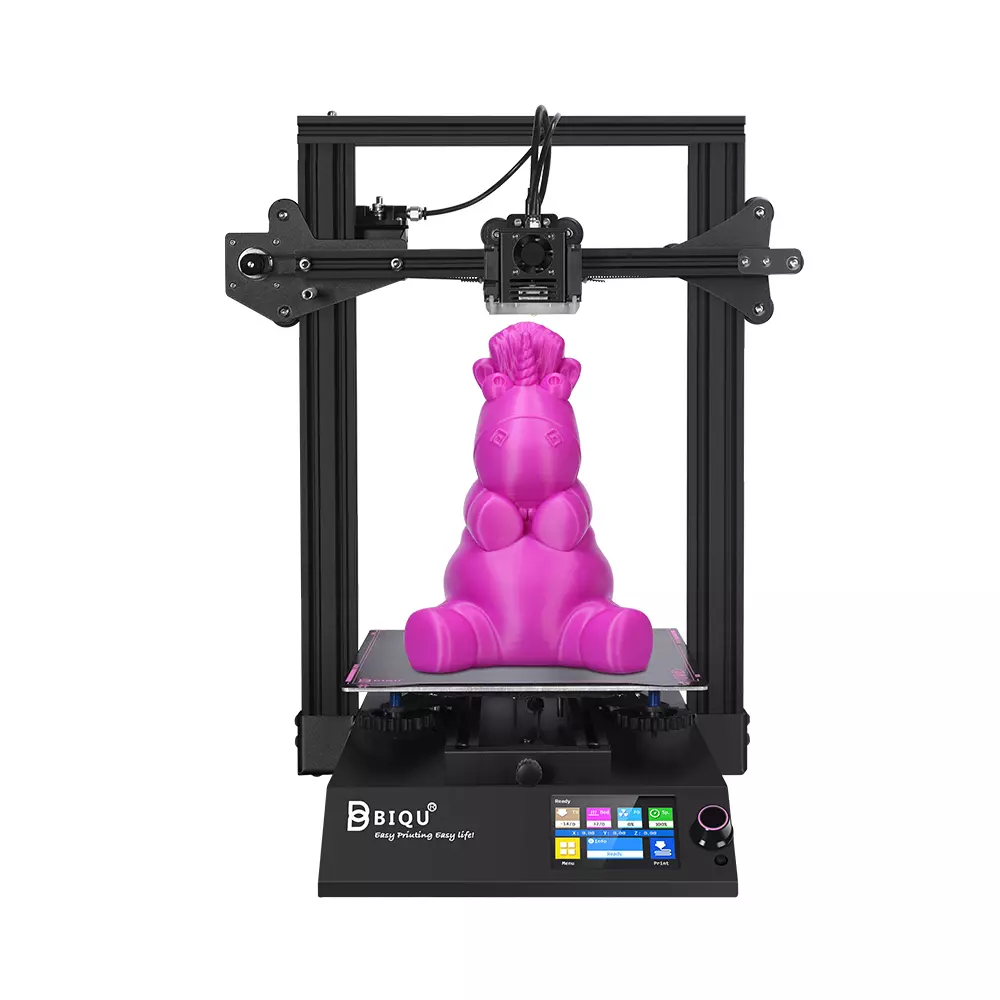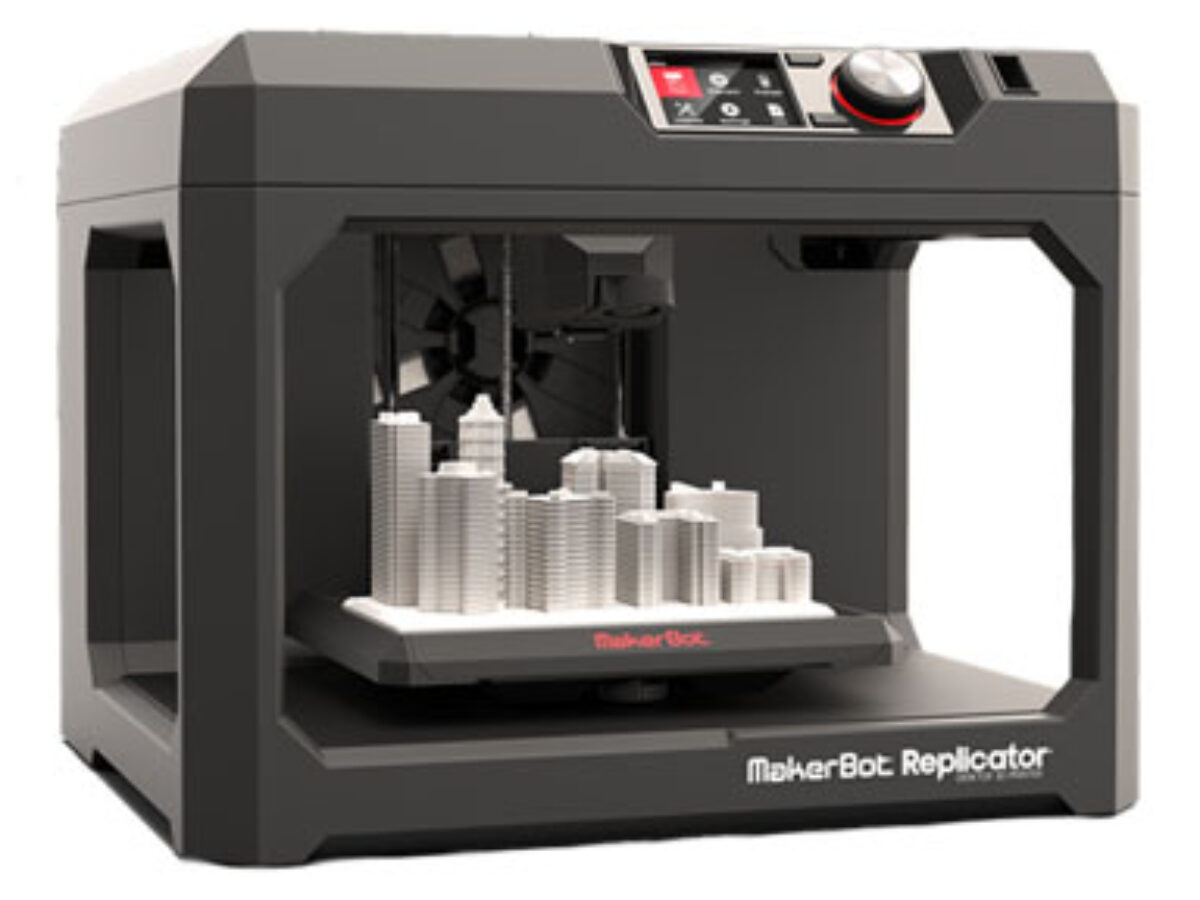Compare BIQU B1 vs Replicator Plus
Comparison between the best 3D printers
Choose the best 3D printer at the best price. The cheapest 3D printers are here.
Buy a 3D printer here with 3D Fila.
 |
 |
|
| Model | BIQU B1 |
Replicator Plus |
| Printing Material | Filament | Filament |
| Buy Filament for BigTreeTech BIQU B1 | Buy Filament forMakerbot Replicator Plus | |
| Estimated price | $269,00 | $2099,00 |
| Manufacturer | BigTreeTech | Makerbot |
| Release Year | 2020 | 2016 |
| Print Volume [mm] | 235x235x270 | 165x295x195 |
| Printer Size [mm] | 412x402x492 | 410x528x441 |
| Weight [kg] | 8,00 | 18,3 |
| Power Loss Recovery | YES | YES |
| Enclosed printer | NO | NO |
| Bed Leveling | Manual | Automatic |
| Filament End Sensor | YES | YES |
| Bed type | Heated | |
| Power supply system | Bowden | Bowden |
| Standard nozzle | 0,4 | 0,4 |
| Maximum Nozzle Temperature [°C] | 250 | 230 |
| Maximum Bed Temperature [°C] | 100 | |
| Maximum printing speed [mm/s] | 100 | 150 |
| Filament holder | YES | YES |
| Camera for supervision | NO | NO |
| Recommended filaments | PLA, TPU, ABS, PETG | PLA |
| Recommended slicers | Cura, Simplify, Slic3r | MakerBot Print Software |
| Maximum Resolution [mm] | 0,1 | 0,1 |
| Processor | 32 Bits BTT SKR V 1.4 | |
| Display | Touchscreen TFT 3,5'' | |
| Power Supply | 24V / 360W | 110/220V / 240W |
| Connectivity | SD / USB | USB / Wi-Fi |
| Operating systems | Windows, Mac, Linux | Windows, Mac, Linux |
| Date of registration in the system | 2021-04-14 | 2022-11-15 |
| Release date | 2020 | 2016 |
| Extra features | The BIQU B1 is an advanced 3D printer with a silent 32-bit BTT SKR V1.4 motherboard and ARM Cortex-M3 CPU, offering DIY interfaces (I2C, SPI, WiFi) and dual Z-axis. Its dual BTT B1 TFT35 V3.0 operating system allows real-time monitoring and multiple printing modes, including G-code visualization effects. It stands out for its BIQU SSS (Super Spring Steel), ensuring easy model adhesion and simplified removal, with the possibility of using it on both sides. It includes a filament sensor, automatically pausing printing in case of filament breakage. The multicolored RGB lights integrated into the hotend allow you to view the printing status even at night. Additional notes include the need for a BIQU-specific Type-C cable and extra interfaces for smart filament sensor and BL Touch. | The Replicator Plus printer is easy to use and has very good print quality. Its software is user-friendly and powerful, with USB, Ethernet, Wi-Fi and support for printing via pen drive. With a safe design for an open frame printer, it is relatively quiet. The Smart Extruder+ detects filament end and pauses printing automatically, in addition to notifying via apps. It has a large print volume, with a non-heated and coated print bed for easy removal of parts. It also has a webcam for remote monitoring of prints. |
| Support for multiple colors and materials (AMS and CFS) | NO | NO |
Notes * |
||
| Cost-benefit | 7 / 10 | 6 / 10 |
| Hardware | 2 / 10 | 2.5 / 10 |
| Tela | . | . |
| Print volume | 3 / 10 | 3 / 10 |
| Performance | 1 / 10 | 1 / 10 |
Conclusion |
| In comparing the BIQU B1 and the MakerBot Replicator Plus, several key factors emerge that can guide a purchasing decision based on needs, budget, and preferences. The BIQU B1 is significantly more affordable than the Replicator Plus, making it an attractive option for those seeking a capable 3D printer without a substantial financial commitment. It boasts a larger print volume, manual bed leveling, and compatibility with a wider range of filaments, including TPU, ABS, and PETG, which provides versatility for different projects. Its advanced features, such as a silent motherboard and a dual Z-axis, enhance both performance and user experience, while its aesthetically pleasing RGB lights add a modern touch. On the other hand, the MakerBot Replicator Plus, while higher in price, offers several advantages, including an automated bed leveling system and robust software capabilities. It features a well-established user interface that is friendly for beginners and provides reliable print quality. Its enhanced connectivity options and the inclusion of a webcam for remote monitoring can be appealing for users who prioritize convenience and ease of use. Ultimately, if the budget is a primary concern and the user is prepared to manage manual leveling and a slightly lower print speed, the BIQU B1 stands out as the better value for its price. However, for those who value user-friendliness, automated features, and additional connectivity capabilities, the Replicator Plus may justify its higher cost. Thus, the choice between the two printers should align with specific user needs, preferences, and financial considerations. |

